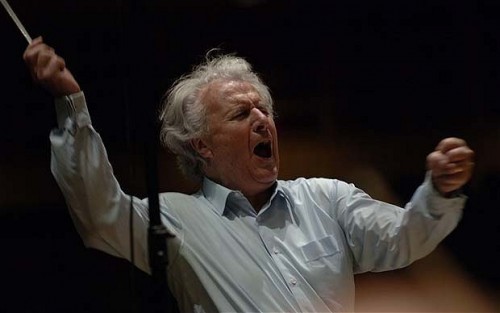Due the tumult of the bombing at the Boston Marathon, the world all but overlooked the passing of Sir Colin Davis, one of the great conductors of the 20thcentury, who died at age 85 one day before that terrible event took place. To list his résumé as the music director and guest conductor of some of the world’s finest orchestras and opera companies is hardly worth the effort – if it’s a great ensemble, he conducted it.
Sir Colin Davis
As Principal Guest Conductor of the Boston Symphony from 1972 to 1984, Sir Colin not only conducted the orchestra four or five weeks a year, he also led some of the orchestra’s great recording projects: the complete Sibelius symphonies (some say the best set ever recorded), and music by Schubert, Mendelssohn and Berlioz. He also was a leading interpreter of Handel, Haydn and Edward Elgar.
Two things that made Davis stand out even among the great maestros were the level of unwavering conviction he had regardless of the repertoire, and his biting wit (which was often, but not always, funny). I recall one rehearsal of Elgar’s music during which the orchestra was becoming a bit listless and unresponsive. (It should be noted that the music of Elgar has often been underappreciated, especially here in the United States) Sir Colin stopped the rehearsal and from the podium slowly circled the stage with a pointed forefinger, encompassing everyone from the violins on the left to the string basses on the right, and said in his most regal British accent, “Regardless of what you might think of this music, never forget that Elgar was a greater musician than you all.” Enough said. Great performance.
He was a true gentleman as well. In addition to Sibelius’ symphonies, one of the pieces we performed and recorded with Sir Colin was “The Swan of Tuonela,” which is essentially an English horn concerto only about nine minutes in duration, but because the music is so slow and dark, it feels as if it’s a half-hour long. One time we were rehearsing it at the end of a double-rehearsal day, which made it feel as if it were an hour long. When we got to the end of the piece, everyone was dying to go home. Sir Colin, in what is standard orchestral protocol, asked our English horn player, “Mr. Thorstenberg, is there anything you’d like to do again?” Perhaps he didn’t know that Larry Thorstenberg was an absolute perfectionist; perhaps he did. But when Larry said, “Maestro, I’d like to do the whole thing one more time,” and the entire orchestra noticeably flinched, Sir Colin didn’t bat an eyelash, and said, “Certainly. Ladies and gentlemen, from the beginning, please.”
Yet, it was none of these things that made the greatest impression on me. Rather, it was an incident in 1975, during my first year in the Boston Symphony and my very first experience working with Sir Colin. At the time I was sitting so far back in the second violin section I was almost underneath the kettledrums and, like all new members, I was still on probation, meaning I had no job security whatsoever. At the first rehearsal with Sir Colin I was impressed with the energy and intensity he demanded (and got) from the orchestra, so at the break, when the rest of the musicians cleared the stage, I stayed in order to look over my part because a lot of the repertoire was still unfamiliar to me. Maestro Davis stepped off the podium but didn’t head for the wings. Instead, he walked directly toward me, looking extremely serious. I should mention here that for a conductor, especially one of such renown, to approach a novice, probationary second violinist in this manner is a highly, highly unusual thing to do, and in my mind things did not bode well. Maybe I had done something wrong and he was going to fire me! What would I tell my parents? He caught my eye, and I gave him a wan smile in return, pretending – I’m sure unsuccessfully – to be nonchalant.
As he got closer, he held out his hand and his face lit up in his inimitably genuine smile, which was quite a relief. With great warmth he then congratulated me on becoming the newest member of the Boston Symphony, but then said something I’ve continued to think about for almost forty years. He said, “If you don’t do it right, no one will.” At first, I wasn’t sure what to make of this comment because there were certainly a 100 musicians around me who were doing it at least as right as I was. So I just nodded and agreed and said thank you. Upon long reflection, though, I believe he meant that as musicians it’s incumbent upon each one of us to take individual responsibility for our art in order to transfer what we have learned to the next generation (of musicians and audience) without the slightest lessening of quality and integrity. Even more broadly, I believe that message applies to life in general as much as it does to music. How we behave in society as individuals may not seem to be all that important in the grand scheme of things, but if all of us were to hold to a mantra of taking individual responsibility to make the world a better place, perhaps we could hope for a more peaceful future. I was greatly saddened when I read that Sir Colin died, partly because I never had the opportunity to thank him for taking the trouble to provide lifelong guidance for a 22-year-old violinist.
“The less ego you have, the more influence you have as a conductor,” Sir Colin said in an interview with The Guardian in 2011. “And the result is that you can concentrate on the only things that really matter: the music and the people who are playing it. You are of no account whatever. But if you can help people to feel free to play as well as they can, that’s as good as it gets.”
Gerald Elias is an acclaimed author and musician. A former violinist with the Boston Symphony and associate concertmaster of the Utah Symphony, he has concertized on five continents as violinist and conductor, and his compositions have been performed throughout the United States. Since 2004 he has been music director of the Vivaldi by Candlelight concert series in Salt Lake City, and since 1989 a faculty member of the University of Utah. His award-winning Daniel Jacobus mystery series, based upon experiences gleaned from his lifelong musical career, takes place in the dark corners of the classical music world and has won extensive critical praise. Visit his website at www.geraldelias.com.
View all posts by Gerald Elias →
Berkshire Fine Arts Dialogue with Gerald Elias
Republication is with the permission of www.reichelrecommends.com


